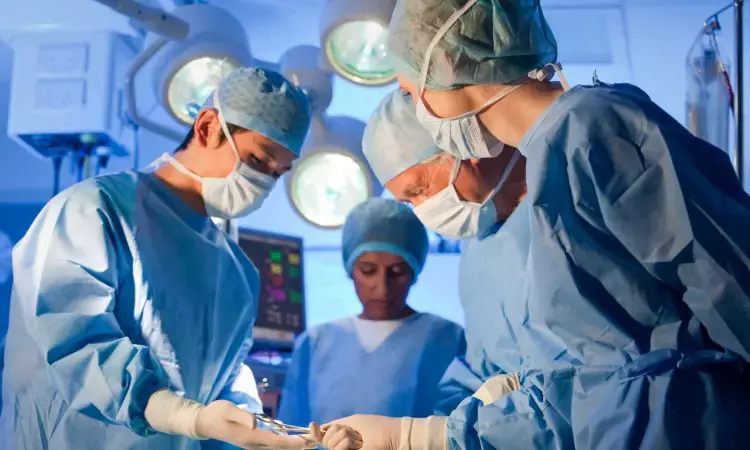- Home
- Medical news & Guidelines
- Anesthesiology
- Cardiology and CTVS
- Critical Care
- Dentistry
- Dermatology
- Diabetes and Endocrinology
- ENT
- Gastroenterology
- Medicine
- Nephrology
- Neurology
- Obstretics-Gynaecology
- Oncology
- Ophthalmology
- Orthopaedics
- Pediatrics-Neonatology
- Psychiatry
- Pulmonology
- Radiology
- Surgery
- Urology
- Laboratory Medicine
- Diet
- Nursing
- Paramedical
- Physiotherapy
- Health news
- Fact Check
- Bone Health Fact Check
- Brain Health Fact Check
- Cancer Related Fact Check
- Child Care Fact Check
- Dental and oral health fact check
- Diabetes and metabolic health fact check
- Diet and Nutrition Fact Check
- Eye and ENT Care Fact Check
- Fitness fact check
- Gut health fact check
- Heart health fact check
- Kidney health fact check
- Medical education fact check
- Men's health fact check
- Respiratory fact check
- Skin and hair care fact check
- Vaccine and Immunization fact check
- Women's health fact check
- AYUSH
- State News
- Andaman and Nicobar Islands
- Andhra Pradesh
- Arunachal Pradesh
- Assam
- Bihar
- Chandigarh
- Chattisgarh
- Dadra and Nagar Haveli
- Daman and Diu
- Delhi
- Goa
- Gujarat
- Haryana
- Himachal Pradesh
- Jammu & Kashmir
- Jharkhand
- Karnataka
- Kerala
- Ladakh
- Lakshadweep
- Madhya Pradesh
- Maharashtra
- Manipur
- Meghalaya
- Mizoram
- Nagaland
- Odisha
- Puducherry
- Punjab
- Rajasthan
- Sikkim
- Tamil Nadu
- Telangana
- Tripura
- Uttar Pradesh
- Uttrakhand
- West Bengal
- Medical Education
- Industry
Chen's Penetrating-Suture technique simple, safe, and reliable technique for pancreaticojejunostomy.

China: A research study in BMC Surgery has concluded that pancreaticojejunostomy, or PPJ is a simple, safe, and reliable technique. According to researchers, postoperative clinical results are ideal, as the study explains.
Following pancreaticoduodenectomy (PD), POPF (Postoperative pancreatic fistula) is the most severe complication. It is also a leading cause of morbidity and mortality.
To date, there is no flawless pancreaticojejunal anastomosis approach.
In this study, researchers from the Affiliated Hospital of Yangzhou University presented a new approach named Chen’s penetrating-suture technique for PPJ. It involves end-to-side PPJ by suture penetrating the full-thickness of the pancreas and jejunum and evaluates both safety and efficacy.
The study results are:
- Following PD, cases recovered well.
- The operative time was 256 min.
- The mean time for performing pancreaticojejunostomy was 12 minutes (median).
- Postoperative morbidity was 19.7%.
- The reported mortality was zero.
- The rate of POPF was 4.7% and 1.0 % for Grade A and Grade B, respectively.
- There were no Grade C cases and one urinary tract infection.
They said, “We found PPJ to be simple, safe and reliable.”
The anastomosis mode had the following features like simple, reliable, convenient, low technical requirements, easy to learn and can be widely used.
Chen’s Penetrating-Suture technique is not affected by the texture of the pancreas, pancreatic remnant size and the pancreatic duct; they wrote.
They explained that the apposition suture of the pancreas and jejunum is neat and facilitate healing with good hemostatic effect.
Further investigations are warranted with more extensive prospective cohort series and prospective randomized studies.
Further reading:
Zhang, L., Zhu, X., Zhu, Y. et al. Chen’s penetrating-suture technique for pancreaticojejunostomy following pancreaticoduodenectomy. BMC Surg 23, 146 (2023). https://doi.org/10.1186/s12893-023-02054-y
BDS, MDS in Periodontics and Implantology
Dr. Aditi Yadav is a BDS, MDS in Periodontics and Implantology. She has a clinical experience of 5 years as a laser dental surgeon. She also has a Diploma in clinical research and pharmacovigilance and is a Certified data scientist. She is currently working as a content developer in e-health services. Dr. Yadav has a keen interest in Medical Journalism and is actively involved in Medical Research writing.
Dr Kamal Kant Kohli-MBBS, DTCD- a chest specialist with more than 30 years of practice and a flair for writing clinical articles, Dr Kamal Kant Kohli joined Medical Dialogues as a Chief Editor of Medical News. Besides writing articles, as an editor, he proofreads and verifies all the medical content published on Medical Dialogues including those coming from journals, studies,medical conferences,guidelines etc. Email: drkohli@medicaldialogues.in. Contact no. 011-43720751


